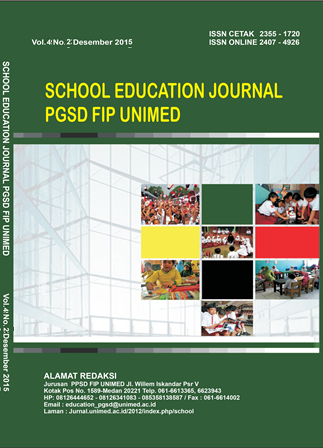PENGARUH MODEL PEMBELAJARAN KOOPERATIF DAN MOTIVASI BELAJAR TERHADAP HASIL BELAJAR BAHASA INDONESIA SISWA KELAS VIII SMP KATOLIK SANTA MARIA MEDAN
DOI:
https://doi.org/10.24114/sejpgsd.v4i2.3616Abstract
The purpose of this study are: (1) to assess the learning outcomes of Bahasa Indonesia of the students who are taught using Jigsaw model of cooperative learning and the learning outcomes of Bahasa Indonesia of the students who are taught using STAD cooperative learning model. The population of this study are all the eighth grade students of St. Maria Chatolic Junior High School, Medan, which consists of three classes: Class VIII A, Class VIII B, Class VIII C. The samples choosen to use the Jigsaw cooperative learning model are determined randomly from the students of Class VIII A (31 students).The samples who will use the STAD cooperative learning model randomly coosen from the students of Class VIII C (32 students). The research instrument used to measure the learning outcomes is the multiple choice test, whereas questionaire is used to obtain the data of the motivation of the students, normality test using Liliefors test, homogenity test using Fisher and Barlett test. Data analysis technique is Anova at significance level α = 0.05, followed by Scheffe test. Kata Kunci : Model pembelajaran tipe STAD, Jigsaw, motivasi belajarDownloads
Published
Issue
Section
License
Authors whose manuscripts are approved are approved as follows:
The publication rights for all journal manuscript materials published/published on the SEJ (School Education Journal) E-Journal site are held by the editorial board with the author's knowledge (moral rights remain with the manuscript authors).
The formal legal requirements for accessing this electronic digital journal article are subject to the terms of the Creative Commons Attribution-ShareAlike (CC BY) license, which means that E-Journal SEJ (School Education Journal) has the right to store, transfer media/format, manage in the form of a database, maintain, and publish articles without asking permission from the author as long as the author's name remains as the copyright owner.
Manuscripts published/published electronically are open access for educational, research, and library purposes.

